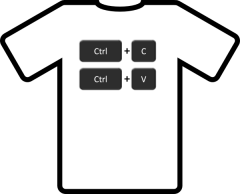First in this review of plagiarism news, there is an update on a recent story from the Goafest advertising festival in India. Bestmediainfo.com has reported that the super-jury, the chairpersons from each of the juries at the Goafest/Abby 2013, has decided that all of the previously withdrawn awards will be reinstated. The Awards Governing Council (AGC) says that there was sufficient time before the final judging to raise any questions about the finalists, and that rules for the rules for future awards ceremonies will be reviewed. Earlier this month, there were many plagiarism accusations against some of the award winners at the South Asian advertising festival.
According to Erin Zlomek for Bloomberg Businessweek, Duke University’s Fuqua School of Business has begun using plagiarism detection software on all applications for their MBA program. The article states that most schools do not disclose whether or not they use plagiarism detection software on admission essays, but schools that have disclosed this information include UCLA’s Anderson School of Management, Penn State’s Smeal College of Business, Wake Forest University, and Northeastern University. Given that it is becoming more common for colleges and universities to check for plagiarism in admissions applications, it is important to bear in mind that plagiarism does not only mean copying from published sources without giving proper credit, but it can mean using another student’s work and claiming it as your own. This was the offense recently made by two law students who were found guilty of plagiarizing essays on ethics. The Canadian Broadcasting Corporation (CBC) reports from Saskatchewan that the two students were found guilty of plagiarizing work done by another student during the previous year. As punishment, the two students must write new papers as well as an essay about their mistakes, and they must withhold any applications to become lawyers for at least 3-4 months. Considering that dismissal from the school or failure of the class is common punishment for plagiarism, these two law students seem to have gotten off rather lightly.
Finally, at Stanford University, the Stanford Daily has been reporting on accusations made against a former Stanford Review journalist, Vasant Ramachandran, who was accused of plagiarizing multiple articles that appeared in the Stanford Review. Dan Cassavaugh made the first accusation saying that Ramachandran plagiarized one of his 2006 articles. Later, evidence of plagiarism in other of Ramachandran’s articles was discovered. As of April 21, all but one story by Ramachandran had been removed from the Stanford Review’s website, and the current Review Editor in Chief has stated that once the articles have been checked for plagiarism, all original works will be immediately re-posted.

